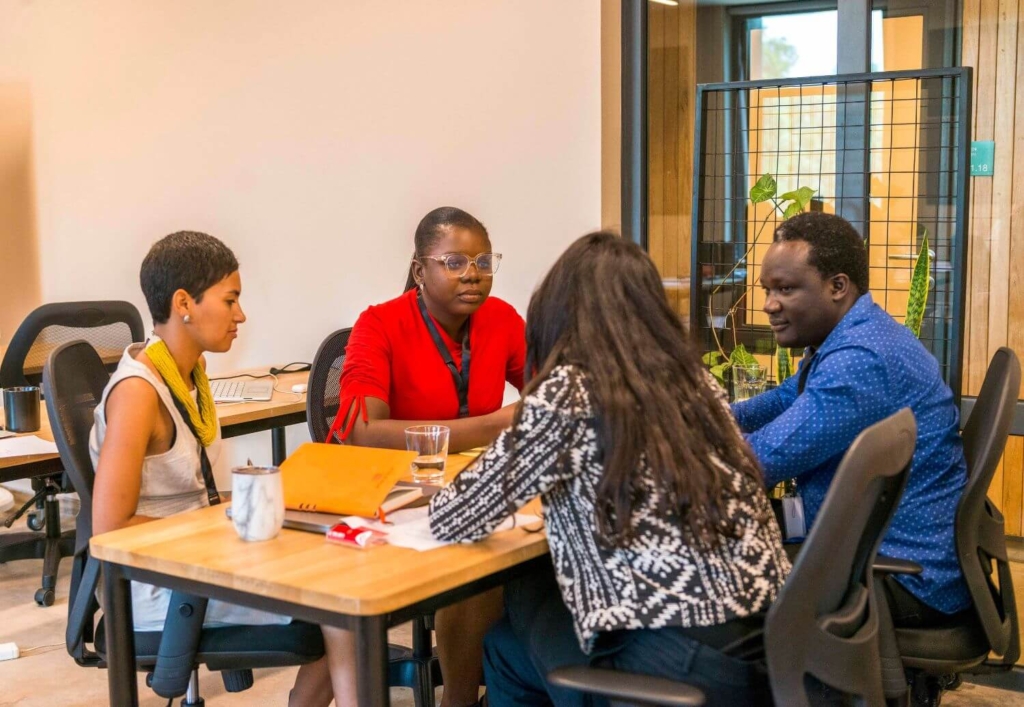Nudging towards inclusive early-stage climate tech investment

The business case for applying a gender equality and social inclusion (GESI) lens to investment has already been made conclusively – we know that firms with greater diversity outperform in terms of greater returns and less risk and that this holds true for both investor firms and companies.
And yet, many components of the venture capital space, climate system in Africa and rest of the world remain persistently male dominated. In Africa, female-led start-ups received only 2.3% of all venture capital. In fact, according to an IDC report, the last 5 years have seen investment in female start-ups or those led by mixed teams diminish rather than grow. There is also significant evidence black entrepreneurs face a whole host of barriers to investment globally and investment in African firms remains largely siloed in a small handful of countries. Alongside this, we know that climate change and disasters do not impact everyone in the same way. Women, girls and vulnerable groups face the greatest threat from climate change with existing inequalities amplified. Given that VC funding in climate technology is growing five times faster than overall VC funding, the race is on to find ways to invest in firms whose solutions tackle these issues, reflect female and minority perspectives and mitigate against the specific challenges they face.
Whilst there is extensive discussion and literature around the barriers and opportunities to inclusive investment, there is clearly a disconnect between the desire to ensure intentionality around GESI investing and its practical implementation beyond ‘ticking boxes’. Many investor companies want to diversify and be inclusive but struggle to know where to start and be intentional – especially given capacity, resources and bandwidth are frequently squeezed. There is a perception that VCs are juggling many competing priorities – fund raising, profitability, internal DEI, meeting the investment thesis, ESG, SDGs, GESI lens investing – which is overwhelming. Adding additional layers of complexity feels like too much, especially given the fact that early-stage climate investment in Africa is still relatively nascent. But we can also see using a GESI approach as feeding into and achieving goals across various investment approaches and supporting the achievement of the climate tech solutions. Given that climate change and disasters impact women so fundamentally, the most successful start-ups will need to apply a GESI lens to truly achieve their goals. Additionally, there is increasing pressure from partners, employees and communities to pursue inclusive investment so those investor firms able to see beyond the initial perceived challenge will have an added advantage in the long run.
So how can we start shifting processes to generate change more intentionally? A key approach must be building momentum and buy-in to using a GESI approach by setting out an initial set of ‘nudge’ activities that diversify investor companies, push company culture in the right direction and generate intentional investment in a diverse range of start-ups. Once small steps have been taken, further medium and long-term activities can be set out and committed to.
So what ‘nudges’ are we talking about?
Be intentional.
A first step must be setting out a VC/company definition of GESI – both internally and within the investment process. Capturing this and cascading down the company will ensure staff are on the same page. Many companies have an internal Diversity, Equity and Inclusion policy, setting the foundation for an inclusive workplace.
Take stock.
No one wants to be clueless so taking stock of where investors and companies sit in regards to GESI will set a baseline. There are multiple freely available GESI frameworks that can be adapted and applied to different industries and markets, reviewing GESI in operations, portfolio management and when undertaking due diligence of firms. These are not particularly onerous and can be completed without committing extensive resources to their completion.
Let’s feel good.
Having taken stock, can we already point to what is being done well to generate positive momentum? Within the focus firm are there already diverse teams, does the company already adhere to equal opportunities or pay scales. Many impact investor firms have greater diversity within their portfolio than they might think. For instance, rather than just looking at the gender of the founder or co-founders, applying the 2xchallenge framework criteria, which also looks at employment and consumption (as well as other factors) to portfolios can demonstrate that they have more diversity than currently captured. Highlighting any positive current activities and successes can help build buy-in rather than putting everyone’s back up by focusing on what’s lacking.
Mindful language & processes.
There is significant evidence that language matters in both company documents and in investment materials so its worth completing a review of language used in materials to ensure they are inclusive and don’t unintentionally put certain groups off. Additionally, traditional investment due diligence models that require collateral are particularly problematic for female founders, particularly in regions where it is legally and culturally more difficult for women to access collateral, thereby immediately making it impossible for some groups to apply to the fund. Whilst it might be challenging to circumvent certain requirements, looking into non-traditional due diligence requirements can mitigate against the issue.
Build awareness of unconscious / affinity bias.
Biases and stereotypes creep into any company and exist in many components of the investment process from deal sourcing, pitching, investment decisions etc. This isn’t about blame – everyone has unconscious bias. Companies frequently claim that they have no issues with biases but are then presented with evidence that they do. In the short term, simply sharing the evidence around how bias presents in the investment process may help to raise awareness. In the longer term, activities could include completing bias tests such as the Harvard Implicit Association Test and providing bias training to staff.
Reflect diversity in investment team, senior management and investment committee.
White men dominate many investment decision making points, which has a knock-on effect in the type of founder and business that receives investment. Hiring, promoting and mentoring to intentionally diversify these teams will promote more creative and unconventional problem solving and result in more inclusive funds.
Identify GESI entry points to encourage habitual thinking.
We don’t want GESI to be a box ticking exercise, but part of the process to push for change is no doubt setting up some flash points internally and within the investment process as reminders to think about it. For instance, setting reminders for each part of the investment process such as sourcing potential start-ups from female or minority network associations, collecting basic GESI data at the initial screening process, incorporating key GESI criteria in the investment committee decks etc. can support habitual thinking.
Monitor what you want to manage.
Collecting data on GESI can start at a basic level. For instance, disaggregating by sex and ethnicity staff composition, founders within the portfolio, FTEs employed by firms etc. At a more complex level, what are the ratios at the screening, interview/pitch and investment levels? Collecting and monitoring GESI data allows VCs to identify gaps and opportunities in this area and set out appropriate and feasible action plans.
Amplify success & support noise around GESI topics.
Identify stories and examples that can be amplified that celebrate successful staff or founders from minority or vulnerable groups or highlight the successes of start-ups that provide solutions for under-represented groups to build positive momentum and increase capacity in the sector.
At Katapult, we are continually striving to push for greater inclusivity within our team and portfolio. We are investing in change and know that though we are making good progress, this is a continual process and a necessary one. So with this in mind, over the near term we are committing to making the following improvements throughout our processes:
Deal sourcing and investment:
. Reviewing and updating the language of our sourcing material to increase inclusivity.
. Seeking out more diverse sourcing partners and networks for more diverse founders.
. Work to be conscious of and minimise unconscious biases in the selection process, particularly as founders ‘pitch’ to Katapult.
. Maximise and further promote use of diversity metrics and data in decision making documentation, including at investment committee.
Our programs:
. Maximise diversity in our mentor and content delivery pool.
. Develop core modules and materials on GESI for our programs
Across the board:
. Build on momentum: celebrate what is being done well, advocate strongly, and don’t be complacent.
. Lead from the top: prioritise GESI at the top of the organization and cascade down all teams at all levels.
. Diversify teams in order to diversify the portfolio: actively pursue practices to increase internal diversity.
. Build intentionality into the investment process – include diversity intentionally throughout processes.
While progress is being made, we acknowledge that creating an inclusive investment landscape is an ongoing process. By embracing intentional and inclusive practices, we can contribute to the development of climate solutions that address the specific challenges faced by marginalized groups and create a more equitable and sustainable future for all.
_______________________________________
This article was produced in collaboration with Katie Cooper (née Clancy). Katie is a Senior Consultant specialising in Gender Equity and Social Inclusion (GESI) issues, rural development and private sector development (PSD).
In 2023 – in collaboration and with support from the FCDO funded RISA Fund – Katapult Africa is furthering our scope of activities, drawing on research to further inform our investment and acceleration strategies, and engage and build the innovation ecosystem. Working across RISA sectors of innovation, climate and agriculture, this initiative will further support our tailoring of the Katapult model to Africa, and align with RISA Fund objectives of Innovation system strengthening (ATIP), and strengthening synergies between research and innovation systems (SRIA and ATIP).
A first key part of our research agenda is around gender equality and social inclusion – GESI.
Learn more about Katapult Africa, here.

